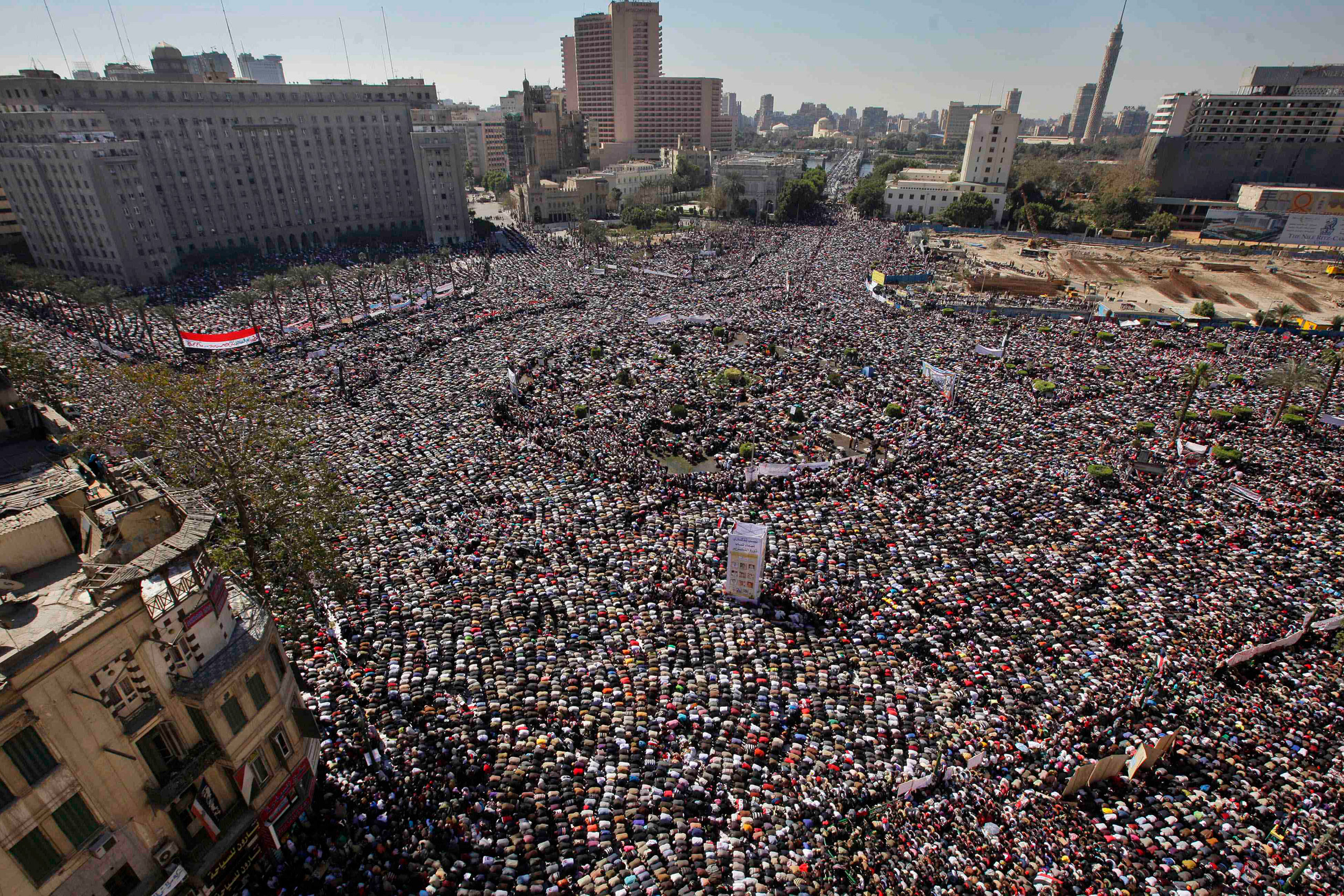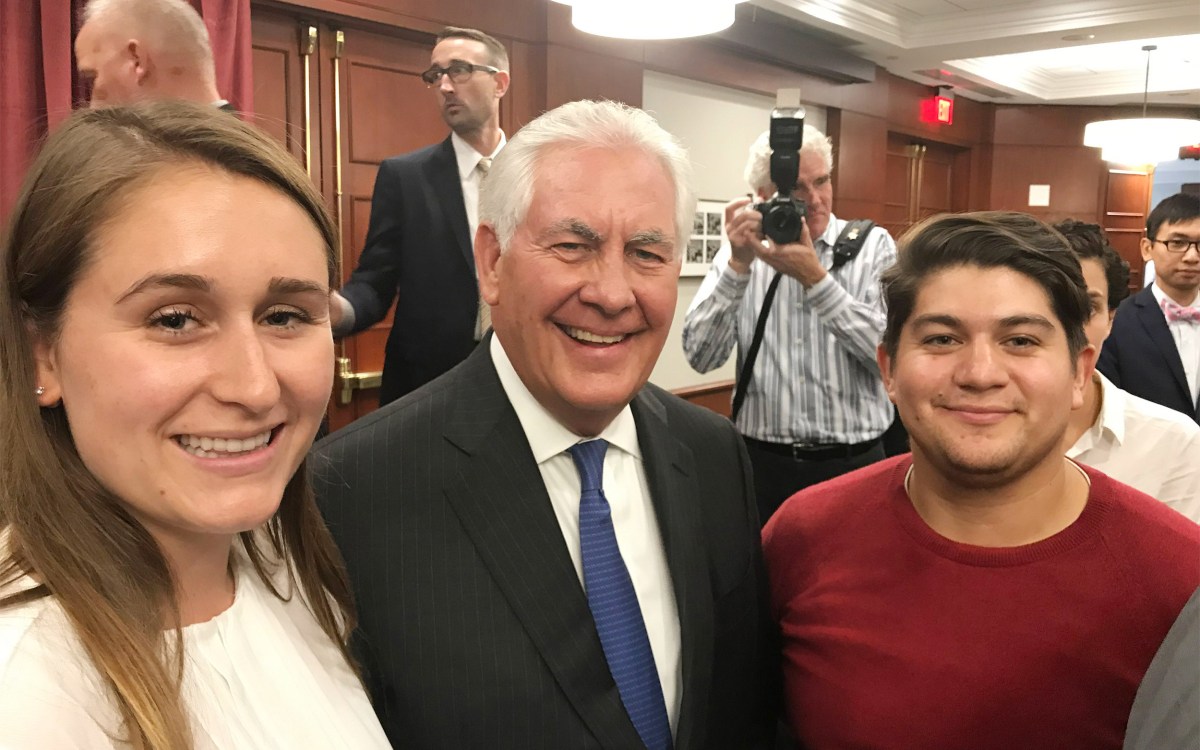
Feb. 18, 2011, Egyptians pray and celebrate the fall of the regime of former President Hosni Mubarak in Tahrir Square in Cairo, Egypt.
AP File Photo/Ben Curtis
10 years later: Was the Arab Spring a failure?
Scholars and analysts suggest that there has been quiet change
Ten years after the mass popular uprising known as the Arab Spring began in January of 2011, optimism can be hard to find. Despite the participation of thousands of people — particularly young people — in protests against the autocratic rulers of Middle Eastern countries, little seems to have changed. Tunisians brought down a dictator and established a representative democracy, but that fledgling republic is struggling. Other countries, such as Egypt, have only replaced one autocratic ruler (Hosni Mubarak) for another (Abdel Fattah el-Sisi), while still others, like Saudi Arabia, appear not to have been affected at all.
Arab scholars and analysts on campus say closer examination reveals an ongoing process — and a decade of change. “It’s like a chess game between governments and the people,” said Hicham Alaoui, a Weatherhead Center for International Affairs associate who has a uniquely personal vantage on the risks and rewards of pushing for liberalization. Born a prince in Morocco, Alaoui tried to work within the monarchy for gradual liberalization, only to be ostracized when his cousin King Mohammed VI assumed the throne.
The initial Arab Spring was “like one giant Woodstock,” said Alaoui. “Joyful anarchy empowered by internet connectivity.” That first burst of energy disrupted the system, but it lacked structure — or plans for the future. In the power vacuum, Islamists rose up, and the surviving autocrats clamped down, as in Egypt, where the military repressed the Muslim Brotherhood. Since then, he said, “Everybody’s doubled down.”
That doesn’t mean that the status quo has been restored. “People might think that the region is stagnant, that we’ve simply gone back to the bad old days of Hosni Mubarak or other Arab autocrats who were exemplars of ossification and stagnation, but that masks a lot of change in the region currently happening,” said Tarek Masoud, Kennedy School Professor of Public Policy and the Sultan Qaboos bin Said of Oman Professor of International Relations.
The initial Arab Spring was “like one giant Woodstock … Joyful anarchy empowered by internet connectivity.”
Hicham Alaoui
Alaoui likens the ongoing change to a “current of magma” flowing beneath the surface. “It repeatedly comes up,” he said. To illustrate, he points to stories that may not be as prominent in the West, such as the massive protests over fracking and water rights in Algeria that began in 2014. These protests resulted in both a ban on fracking and, in 2019, contributed to the fall of the country’s longtime ruler, Abdelaziz Bouteflika. “These issues touch on questions about dignity, justice, corruption, and economic equality,” said Alaoui.
Another, less-visible change, Masoud said, is coming from within the establishment. Although many in the West focused on the original Arab Spring’s call for a voice in government — what we interpret as representative democracy — what matters to many is more basic, he said: prosperity, security, and political accountability.
“The drivers of the change are not the photogenic, admirable, creative young people who brought us the Arab Spring,” he said. Instead, change is coming from pragmatic reformers within the system who seek to retain control by offering functional — and less corrupt — government. “They’re actually the successors of the autocrats,” he said.
“If you look at the region right now, it’s really torn between these two movements: one movement for democracy, and another that’s led from the top by so-called modernizing autocrats who are saying to their people, ‘Look, we understand that our societies are bedeviled by a host of problems that are the result of decades of mismanagement.’”
The modernizing autocrats, said Masoud, who also serves as the faculty chair of the HKS Middle East Initiative, tout their control as an effective force for good. Their reasoning, he said, is: “We are going to use the authoritarian power of the state, not to enrich ourselves, but to improve the quality of governance, improve government services, to unleash our economies, to rebuild our infrastructure, and even to get rid of old reactionary social norms and forces that have held the region back.”
He gives as an example the modernizations undertaken by Mohammed Bin Salman in Saudi Arabia. While maintaining near complete control of the country, MBS — as Bin Salman is known — has nonetheless loosened some social restrictions, such as allowing women to drive. “My belief is that the Saudi government looked at these uprisings of young people across the region and said, ‘If we don’t change things, we are going to find that happening here, and we’re not going to be able to weather it,’” said Masoud. “There’s the realization that you cannot simply feed at the public trough and be completely inattentive to the aspirations of your citizens.”
The change, said Masoud, may not stop there. “It’s possible that if these autocrats are successful in their modernization schemes, they will then produce societies that, in a very organic way, demand and secure a greater voice and accountability,” he said.
The international community has a role in what happens next. “It remains to be seen whether the Biden administration is going to renew the United States’ engagement with these issues of governance in the Middle East,” said Masoud.
One area in which the U.S. may re-engage is human rights, which have a troubled record in many countries in the region. “If they are going to make human rights part of the discourse, that is going to have an effect,” said Alaoui.
In the case of the U.S. and Saudi Arabia, things may be additionally clouded by the case of Jamal Khashoggi, a contributing columnist for The Washington Post who was murdered in the Saudi consulate in Turkey. That case turned an unflattering spotlight on the iron-fisted regime of MBS.
Masoud, however, is hoping that the international community will also support the Arab Spring’s one success story — Tunisia — by “providing aid and trade and diplomatic support and really help that fledgling democracy stay on its feet.”
“If the United States puts its thumb on the scale in favor of greater freedom and greater respect for human rights, then that might have an effect on at least nudging open political systems in that part of the world,” he said.







